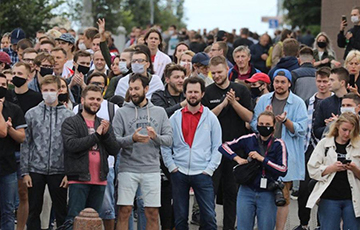Thousands of Belarusians Boycott Utility Payments
36- 8.10.2020, 17:31
- 145,196

Something unique is happening in the country.
In Minsk, the number of debtors for public utilities increased. Since August 2020, when Lukashenka severely suppressed protests after the elections, tens of thousands of families declared a boycott to housing and utility services. Something unique is happening to Belarusians. Naviny.by learned more information.
The latest statistics on debtors of utility bills provides a great opportunity to assess the impact of calls to stop funding Lukashenka's dictatorship. Only in Minsk, the growth for August alone equals to more than 28 thousand personal accounts.
For political reasons
At the request of journalists, the department for the collection of accounts receivable of Unified Settlement and Payment Processing Centre of Minsk reported the latest data.
Compared with July, the share of those who decided not to pay the utilities in August increased by 3.53 % - up to 10.39% of the number of households.
In August 798,366 households of Minsk received bills for communal services. That's why we suppose that more than 28 thousand families boycott the payment for housing and utility services for political reasons. At one's own risk.
Some of them have had the light cut off, and some of them make arrangements with the inspectors.
Protesting people are not afraid of any inconvenience, or deprivation of property or freedom. Some of them try to cushion the blow.
Naviny.by talked to participants in the economic resistance.
Evgeniya Tyuleneva, the national director of the Prus-Size Miss World in 2017, does not pay the utility bills for the fourth month. She realizes that she will be subject to a high interest-based penalty later. However, the payment of utility bills is one of the few economic measures that she can exercise to demonstrate her position.
"In my opinion, utility workers are doing different things: cut off ribbons, paint over beautiful murals. I do hope that they will get tired of it, also because of the lack of funds for the purchase of paint at the moment", the runner-up explains her position.
A Belarusian IT specialist Vadzim, 38 years old, boycotts the payment for two months. He transfers 1 ruble for a three-room apartment. He calls this "an act of civil sabotage against lawlessness and violence in the country at all levels".
"The interest-based penalty is now higher than any interest on loans, but I would like to believe that the new government will get it," explains Vadzim.
Vadzim's family has also imposed economic sanctions against businesses more closely affiliated with the authorities, ignoring their stores. Previously, the family used to spend $300-400 a month in E-Dostavka, now it's zero. Consumption of goods with high excise rates has been minimized.
Vadzim exercises other forms of civic protest: "I take part in marches, the life of the neighbourhood, actively use 115.bel, do not keep money in a bank, minimize tax payments, make donations to funds that support victims of repressions".
Elena is a mother with many children. She pays minimum for utility services and rent tax. She does not pay for transportation on public transport. For the sake of children's safety, she told about her economic resistance anonymously:
Two times Elena met with the inspectors on public transport: "The inspectors were on the sie of the people and issued no fines. I explained that I do not pay in protest against the violence of illegal authorities".
"It was extremely har to morally pay the state back in May. I observed the situation during the elections. After August 9, the military junta remains in power. It deprives us of even the semblance of rights and freedoms, leaving only our responsibilities," the mother of four children explains her motivation in the fight against the authorities.
Satyagraha in Belarus
Non-payment of utilities, taxes, public transportation, neglect of products of certain manufacturers, and so on are tactics to achieve political goals without violence. In particular, India used it against the British colonizers. Mahatma Gandhi gave the practice of non-violence a geopolitical meaning, calling it Satyagraha (Sanskrit - holding onto truth).
It aims to turn the opponent into an ally and friend: appealing to the conscience is more effective than threats and violence.
Andrus Takindang, performer of Satyagraha, Recha band:
- There is economic expediency, and there is a moral one. The musicians and I play at self-organized yard concerts almost every day. In fact, a particular yard takes over the function of an executive committee. It is not economically sound. But there is a more crucial underlying process - the formation of a responsible, conscious society.
Before paying, a person realizes whether he wants to support its ideology by purchasing something produced by this company. It makes the process unique. For the first time, people are fighting not for sausage but morality. And Satyagrah is not about economics, but about morality.










